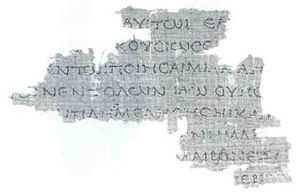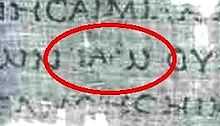4Q120


The manuscript 4Q120 (also pap4QLXXLevb) is a Septuagint manuscript of the biblical Book of Leviticus. The Rahlfs-No. is 802. palaoegraphycally is dating from the first century BCE. Currently the manuscript is housed in the Rockefeller Museum in Jerusalem.
This scroll is in a very fragmented condition. Today it consists of 97 fragments, of the total of fragments can decipher and assign 31. The text of Leviticus 1.11 to 5.25 is attested. The remaining fragments are too small to allow reliable identification. In addition to smaller text-critical variants, the manuscript represents the divine name in Greek characters as ΙΑΩ (trigrammaton) in Leviticus 3:12 (frg. 6) and 4:27 (frg. 20), instead of later common practice in Christian Septuagint manuscripts (dating from ca. 3rd century CE and later),[1] for replace it with κύριος. The Codex Marchalianus is the only other manuscript that has ΙΑΩ to represents the tetragrammaton.[2] Scriptio continua is used.
Also space bands are occasionally used for the separation of sense and sentence units. An special sign (⌐) for paragraphs separation is found fragment 27 between the lines 6 and 7. At this point start subsequently to common classification of these verses from 5:20-26, but according to the Greek and Latin tradition of the incision marks the transition from chapter 5 to 6.
References
- ↑ Larry Hurtado. "The Divine Name and Greek Translation". Retrieved 2013-06-03.
- ↑ David Edward Aune (2006). Apocalypticism, Prophecy and Magic in Early Christianity: Collected Essays. Mohr Siebeck. p. 363. ISBN 3-16-149020-7.
Bibliography
- Skehan, Patrick W. (1957). The Qumran Manuscripts and Textual Criticism,: Volume du congrès, Strasbourg 1956. Supplements to Vetus Testamentum 4. Leiden: Brill Publishers. pp. 148–160..
- Ulrich, Eugene (1992). 120. pap4QLXXLeviticusb in: Discoveries in the Judean Desert: IX. Qumran Cave 4 IV. Oxford: Clarendon Press. pp. 167–186,. ISBN 0-19-826328-7.
- Ulrich, Eugen (1992). by George J. Brooke and Barnabas Lindars. SBL Septuagint and Cognate Studies Series 33, ed. The Septuagint Manuscripts from Qumran: A Reappraisal of Their Value, in: Septuagint, Scrolls, and Cognate Writings. Atlanta: Scholars Press. pp. pp. 49–80.